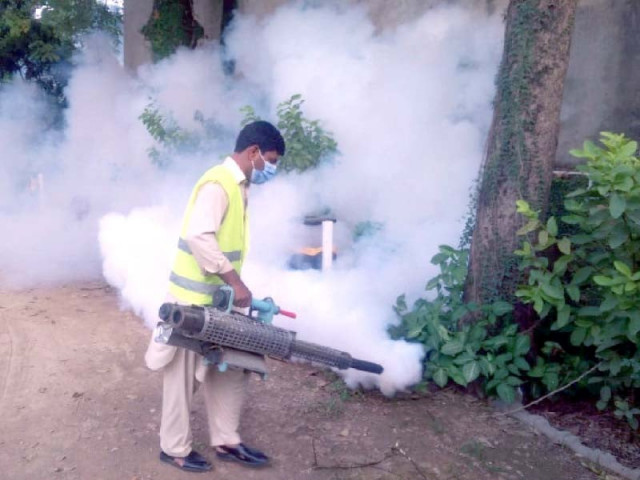Dengue reigns supreme, once again
Lack of timely fumigation, stagnant water bodies continue to threaten public health in the core province

With the onset of the monsoon season, the reign of the dengue mosquitos has begun yet again in Punjab, where mere verbal assurances from the disease control authorities on their prevention strategies continue to threaten public health.
The government's policy of conducting house-to-house spraying for dengue mosquito prevention has been practically halted for the last three years, while fogging spray is only done in a few places, after which a "satisfactory" report is submitted to the department. Such negligence comes at a hefty cost for locals in the province, who are consistently plagued by the worry of being bitten by mosquitos.
Syed Kashif Ali Tirmizi, a resident of a posh area in Lahore, revealed that he and his family contracted the dengue fever every year, due to which they had to spend 15 to 20 days in isolation. “During the rainy season, stagnant water in our area leads to the formation of larvae, which then spreads in the form of dengue mosquitoes. Dozens of cases are reported in our area every year, but no spraying is done by the health department or local authorities,” lamented Tirmizi.
Agreeing with Tirmizi, Farhat Rasheed, the headmistress of a local school, confirmed that dengue cases continued to be reported despite the awareness efforts of their teaching staff since the district administration did not fumigate on time. “The dengue spray is only on paper, and no actual spraying is done to prevent dengue,” said Rasheed.
According to data obtained by the Express Tribune over 3,000 dengue cases have been reported this year while in the last 13 years, more than 335,000 cases of dengue have been reported and more than 613 deaths have occurred. Furthermore, a dengue emergency has been declared in Rawalpindi due to the highest number of reported cases.
The in-charge of a local laboratory stated that during a dengue outbreak, the prices for dengue tests increased in order to save patient’s lives. “Last year, during the dengue season, single platelets were sold for up to Rs20,000, and mega platelets were sold for Rs30,000 to Rs32,000. This year, prices are expected to increase further,” he confirmed.
Similarly, Abdul Rahman Mushak, the owner of a local general store, revealed that in smaller areas where mosquitoes have a high breeding rate, people use mosquito nets. “The prices of these nets increase by Rs500 to Rs1,000 every year. Currently, medium-sized mosquito nets are available for Rs1,800 to Rs2,500,” claimed Mushak.
On the other hand, Professor Dr Naveed Akbar Hotiana, medic from a local government hospital assured that the hospital was fully prepared for dengue cases this year. “So far, more than 2,000 cases have been reported in Punjab, and their treatment is ongoing,” disclosed Dr Hotiana.
Speaking to the Express Tribune on the matter, Dr Yadullah Ali, Director of Health Services for Common Diseases and Epidemic Control, stated that the only solution to get rid of the dengue outbreak was to maintain cleanliness and continuously spray disinfectants in stagnant water bodies and streets to eliminate breeding grounds for dengue mosquitoes.
“Using mosquito nets at night and spraying insecticides in homes is crucial. The fogging spray program is being restarted. Due to some complaints and issues with the quality of spraying, the district government had temporarily halted the house-to-house spraying initiative. Dengue cases are being reported in Lahore, Faisalabad, Rawalpindi, Sheikhupura, Gujranwala, and Sahiwal. The department conducts emergency checks and spraying in the homes and areas of those who file complaints on the department's dashboard. Dengue teams work for nine months of the year.”



















COMMENTS
Comments are moderated and generally will be posted if they are on-topic and not abusive.
For more information, please see our Comments FAQ